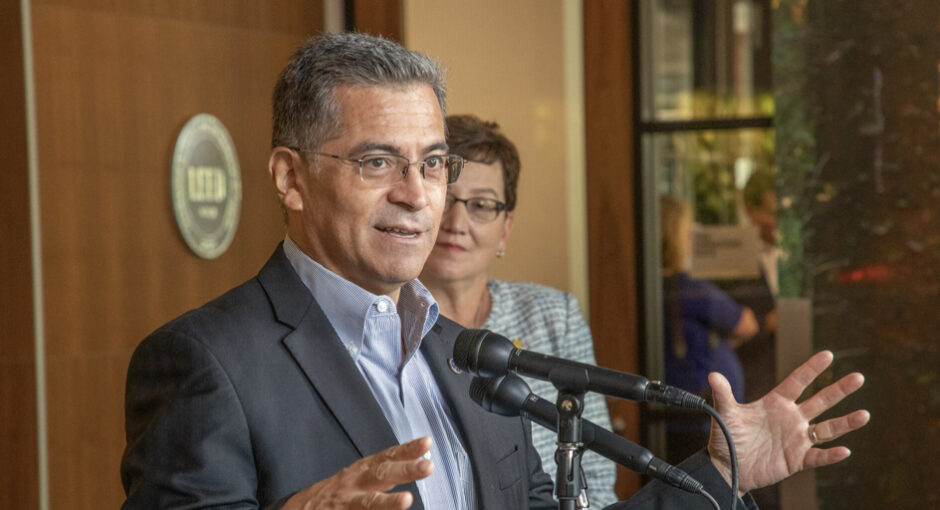U.S. Health and Human Services Secretary Xavier Becerra told members of Congress on Thursday that his department is doing all it can with the tools it has to address drug manufacturers’ denials of 340B pricing involving contract pharmacies.
If lawmakers want his department to do more, they need to give it more regulatory power and money, he said.
“Legislative action is needed to strengthen the tools that the agency has to ensure the accountability and oversight that we all believe is necessary here,” Becerra said in a Sept. 1 letter to Reps. Abigail Spanberger (D-Va.), Cindy Axne (D-Iowa), Doris Matsui (D-Calif.), David McKinley (R-W.Va.), Dusty Johnson (R-S.D.), and John Katko (R-N.Y.).
Becerra asked the lawmakers, if they had any follow up question, to have their staffs contact the HHS assistant secretary for legislation.
The Secretary was responding to the July 15 letter he got from 181 bipartisan House members urging the Health and Human Services Department (HHS) to take action against all 18 manufacturers that restrict access to 340B pricing when covered entities use contract pharmacies. Spanberger, Axne, Matsui, McKinley, Johnson, and Katko spearheaded the letter.
Becerra pointed out in his Sept. 1 response that the Health Resources and Services Administration (HRSA) has sent nine of the manufacturers letters telling them their restrictions are illegal and must end. “We also have referred several of these manufacturers to the HHS Office of the Inspector General,” he added.
The 181 lawmakers want HHS to step up its enforcement actions. “Further delay of enforcement actions emboldens more manufacturers to begin overcharging safety net providers, threatening the integrity of the entire 340B program,” their letter said.
The representatives are frustrated with HHS’s slowness to fine drug makers up to $6,323.00 for each instance of 340B program overcharging. They also want all 18 manufacturers to receive demand letters telling the companies to stop their actions.
Becerra responded, “While there is ongoing litigation around this issue, HRSA has and will continue to exercise its available authority under the 340B statute to hold manufacturers accountable for compliance.”
“At the same time,” he said, “the President’s budget includes a proposal to ensure that HRSA has broad rulemaking authority to support the 340B program as well as an increase of $7 million to expand HRSA’s program integrity efforts, including increased audit and oversight efforts.”
Covered entity groups that worked to get as many House members as possible to sign the letter to Becerra probably will be upset by what they may perceive as his tepid response from the secretary on contract pharmacy, as well as by his implicit call for more money and authority to beef up oversight of compliance with 340B program requirements.
While the groups will likely be publicly complimentary of the Secretary’s response, a number of the most influential 340B provider organizations have long opposed giving HRSA broad regulatory authority. They believe that HRSA has sufficient enforcement powers through the agency’s use of federal guidance. They are also frustrated by what they believe is a slow response by the government to the contract pharmacy stalemate. Particularly the fact that none of the drug manufacturers have been hit with civil monetary penalities (CMPs) at this time. Sen. Chuck Grassley (R-Iowa), a senior Republican lawmaker active on 340B matters, has also been pushing the HHS Office of Inspector General to take action against the drug manufacturers.
HRSA’s March 28 budget request for the fiscal year that begins Oct. 1 asked for comprehensive regulatory authority over the 340B program. It also sought authority to audit covered entities about how they use net income derived from 340B drug purchases, and to require entities to report how much money they make through 340B and how they use those revenues to HRSA.
HRSA said in its budget request that it has received “significant feedback from Congress urging HRSA to take action under the authority it has in the statute, which we have done to the fullest extent.”
“However that authority is not sufficient. Legislative action is necessary to provide the kind of transparency, accountability, and oversight needed to ensure that the intent of the program is met,” HRSA said.
HRSA asked for $17.2 million for the coming fiscal year, a $6 million increase. It said it would use the money to support implementation of the 340B administrative dispute resolution (ADR) process and boost the annual number of covered entity audits from 200 to 225 and the number of manufacturer audits from five to 10.
The House Appropriation Committee wants to give HRSA $13.2 million next year. It said in a report that accompanied its spending bill for HHS that “it is concerned about the growing number of drug manufacturers “that curtail the use of 340B drugs in contract pharmacies.” It encouraged HRSA to use “any available measures,” including imposing civil monetary penalties, “to hold those drug manufacturers in violation of the law directly accountable.”
The Senate Appropriations Committee wants to give HRSA $12.2 million for FY 2023. It also wants a report from HRSA no later than 120 days after the HHS appropriations bill is passed “on actions taken to safeguard [340B] covered entities’ lawful access to discounted drugs.”
“The committee is concerned that manufacturers continue to deny 340B pricing for drugs purchased by covered entities for use in contract pharmacies,” the panel said in the explanatory statement that accompanied its spending bill.


